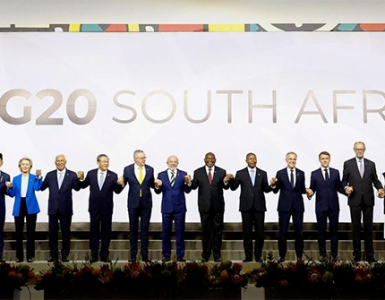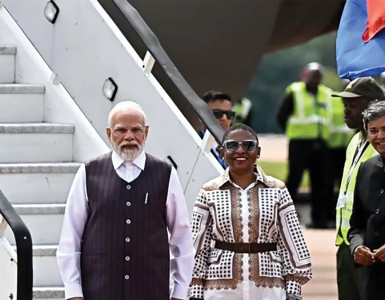CONFLICT: South Africans have to demand an academic boycott of Israel, in the same way much of the Global South boycotted apartheid South Africa’s universities…
By Savo Heleta
“Having achieved our own freedom, we can fall into the trap of washing our hands of difficulties that others face. Yet we would be less than human if we did so.” Nelson Mandela spoke these words in 1997. He was referring to Palestine.
Mandela highlighted that the freedom achieved by black South Africans would remain “incomplete without the freedom of the Palestinians” and other oppressed and subjugated people around the world.
South African university leaders and administrators, along with their counterparts around the world, like to talk about social justice, equity, and equality. These terms can be found in most institutional documents, visions, strategies, and on the university websites. But all too often, social justice, equity, and equality remain little more than rhetoric.
Universities also like to quote Nelson Mandela but tend to be very selective. Mandela’s words about Palestine, or his 1990 speech where he called the apartheid education in South Africa “a crime against humanity,” are hardly ever mentioned.
As we consider many decades of Palestinian suffering under Israeli apartheid, settler colonialism, military occupation, and countless crimes against humanity—as well as the current indiscriminate brutality and collective punishment seemingly aimed at the total erasure of Palestine—one would expect to hear something, anything, from South African university leaders and administrators. Yet, there is deafening silence.
This is not to say that university communities—from progressive academics and staff, workers and students—are not speaking out and organizing. They often do this despite the challenges they face at their institutions. A statement of solidarity with the Palestinian people has been signed by many educators, artists, students, and cultural workers in South Africa and beyond.
But, perhaps, we are expecting too much from epistemically untransformed colonial and neoliberal institutions. In particular, historically white universities remain bastions of coloniality and whiteness, colonial outposts and propagators of Euro-American hegemony.
Why would South African universities, which continue to propagate “syllabuses designed to meet the needs of colonialism and apartheid” long after 1994 care about Israeli apartheid and other struggles and injustices in the world?
- Dr Savo Heleta is the survivor of the Bosnian war in the 1990s. He has spent many years in South African higher education. He writes here in his personal capacity
Archbishop Desmond Tutu wrote in 2014 that “those who continue to do business with Israel, who contribute to a sense of ‘normalcy’ in Israeli society, are doing the people of Israel and Palestine a disservice. They are contributing to the perpetuation of a profoundly unjust status quo.”
Since Archbishop Tutu spoke about the need to stop engaging and doing business with apartheid Israel, South African and Israeli higher education systems and universities have been engaging in significant scholarly collaboration and co-production of new knowledge.
To analyze South Africa-Israel academic research collaboration, I unpacked the bibliometric data from Scopus, one of the largest curated databases and indexes of scholarly publications in the world. Most of South Africa’s scholarly output is indexed in Scopus. The Scopus database provides a reliable, comprehensive, and up-to-date picture of the trends in research collaboration involving South African and Israeli academics and researchers.
Between 2013-2022, Israel was an important collaborator for South Africa, sitting at 37th spot on the list of South Africa’s top collaborating countries. To put this in perspective, only four African countries made it into South Africa’s list of scholarly collaborators before Israel.
However, when we take a closer look at the Scopus bibliometric data, it becomes clear that not all universities in South Africa collaborate significantly, or at all, with Israel. The chart below shows at which public universities’ collaboration with Israel is taking place.
The chart highlights that over the past decade, half of South Africa’s research collaboration with apartheid Israel was done by the University of Cape Town (UCT) and the University of the Witwatersrand (Wits), closely followed by the University of Johannesburg. Other universities that collaborate significantly with Israeli institutions are the University of KwaZulu-Natal, Stellenbosch University, the University of South Africa, the University of Pretoria, and the University of the Free State. All other South African public universities combined have contributed only 7% to South Africa’s collaboration with Israel.
The current collaboration between historically white universities in South Africa and Israeli institutions is nothing new. They collaborated extensively during South African apartheid and have continued to do so after 1994.
It is important to highlight that UCT and Wits have produced more co-authored scholarly publications with institutions from apartheid Israel than any African country over the past decade. These same institutions are geographically located on the African continent and like to claim to be the “gateway to the continent” (in the case of UCT), or speak about the importance of collaboration with the African continent (in the case of Wits).
The chart also shows a clear division between historically white and black institutions in South Africa. When it comes to South Africa-Israel research collaboration, this happens at historically white universities and at some merged institutions whose dominant sections were white institutions during apartheid (such as the University of Johannesburg).
For historically black institutions, which were repressed, underfunded, and prevented from being knowledge producers for much of apartheid rule, collaboration with Israel is not a priority. But how to explain the current silence of the leaders and administrators at historically black universities that do not collaborate with apartheid Israel?
If the past anti-apartheid struggle, international solidarity with anti-apartheid movements, and the post-apartheid rhetoric about social justice and equality are to mean anything in moments such as this one, we have to ask critical questions and demand clear answers from university leaders.
Palestinian universities and academics have been calling for an academic boycott of apartheid Israel for many years. Once again, they are asking us to act, speak out, and stop collaboration with Israel.
We must demand that higher education institutions acknowledge and adhere to the terms outlined in the Palestinian Campaign for the Academic and Cultural Boycott of Israel (PACBI), in the same way the African continent, much of the global South, and Nordic countries boycotted apartheid South Africa’s universities.
This will not end Israel’s occupation of Palestine and the ongoing crimes against humanity, but it will send a statement that we do not want to contribute to the “perpetuation of a profoundly unjust status quo,” to quote Archbishop Tutu again.
- The article was sourced from Africa Is a Country, a site of opinion, analysis, and new writing on and from the African Left. Dr Savo Heleta is the survivor of the Bosnian war in the 1990s. He has spent many years in South African higher education. He writes here in his personal capacity
Comment
GOVT MUST SHUT DOWN DEADLY SPAZA SHOPS
Informal grocery businesses popularly known as spaza shops which have mushroomed all over the country, must be regularly monitored by law enforcement agencies to establish, amongst others, if the owners are legally in this country and allowed to run these businesses.
South Africa’s Home Affairs Minister, Aaron Motsoaledi must be supported in his recent call to municipalities across the country to carry out audits on spaza shops especially those owned by foreign nationals. This call should not be construed as being xenophobic. It is purely from a legal point of view with the law stipulating that those foreigners doing business in this country must be in possession of legal papers and licences that allow them to operate businesses in South Africa. The call to conduct regular checks on spaza shops followed recent tragic incidents in which children died after allegedly eating expired products bought at certain spaza shops in Gauteng and Free State. There has since been claims that there were other children, mostly pupils, who had been taken to medical institutions after having fallen sick due to food they had bought at spaza shops.
It is a fact that most of these shops are operating from residential premises and paying huge amounts as rent to the property owners. Most of these rooms which are crammed with groceries, also serve as a kitchen and bedroom which makes these informal businesses a health hazard. These shops are never visited by merchandisers to check on expired goods. The owners hardly have time to do that either. Even if they did, it is doubtful if they would confiscate these goods as they believed this would be a waste of money.
Motsoaledi also raised concerns about the improper use of residential premises to run these businesses and hinted that legal owners of spaza shops should in future be tax compliant. They should also be legally registered and provide documents that they are permitted to trade in this country.
It is obvious that corruption was to blame for the rapidly growing business in South Africa’s townships. Some, if not most of foreign-owned spaza shops, were acquired through bribing certain Home Affairs officials who granted them permits and identity documents to stay and trade in the country. The recent spate of deaths involving school children should be an eye opener to the South African authorities about people who care less about what they sell to local communities. The government must impose harsh laws against spaza shops which sell expired foodstuffs to our communities which are dangerous and result in deaths. Health inspectors throughout the country must do their job and regularly visit these shops to establish if the owners are legally in the country and if they complied with South Africa’s immigration Act regulations.
Besides being a booming business raking in millions in revenue annually, the authorities cannot allow unauthorized people to operate these businesses with the aim of making money and killing our children by selling them poisonous foodstuffs.

































